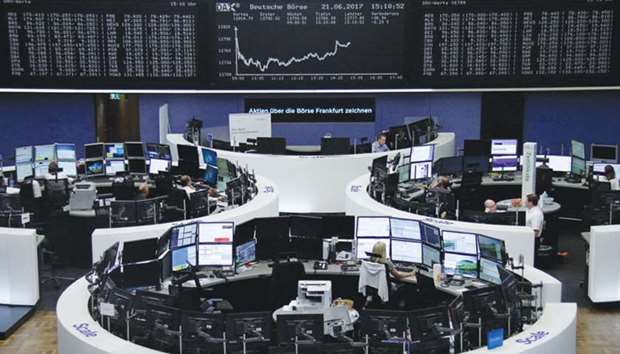Global stocks sank yesterday as the energy sector took a beating from an oil price slump.
Crude prices slid further after diving more than 2% on Tuesday on increasing fears of a global supply glut, as continued production in the US and elsewhere offsets an Opec output cut deal.
“Cheap oil is taking its toll on the global equity markets,” noted analyst Ipek Ozkardeskaya at trading firm London Capital Group.
Crude prices are considered crucial to the smooth running of world financial markets because the commodity oils the wheels of the global economy.
The FTSE 100 was down 0.3% at 7,447.79 points and Frankfurt stock markets ended the day down 0.3% at 12,774.26, while Paris shed 0.4% at 5,274.26 in value.
“Stocks in Europe are offside today as investors are still a bit wary about the large drop in oil over the past couple of weeks,” said analyst David Madden at CMC markets.
“The last two trading sessions have been a reminder of late 2015 and the beginning of 2016, when the collapse in the oil price sparked fears about global growth.
“Investors are worried a depressed oil price could bring about a period of prolonged low inflation, which would have negative implications for growth.
“The other fear about falling oil prices is declining inflation, as it can hamper growth prospects.”
New York oil on Tuesday hit a seven-month low at $42.75 per barrel, and London Brent crude struck a similar nadir at $45.42.
Prices later recovered somewhat but resumed a downward trend yesterday, even though US oil inventories fell last week by a bigger than expected 2.45mn barrels and a drop in petrol stocks.
The oil slump saw energy firms dragged down Tuesday on Wall Street.
Elsewhere yesterday, investors digested the British government’s legislation plans, laid out in Queen Elizabeth II’s speech to parliament, focused heavily on Brexit plans.
British Prime Minister Theresa May presented eight draft laws to take Britain out of the European Union in a programme read out by the queen.
The laws include the “Great Repeal Bill” to overhaul existing EU legislation and separate bills on customs, trade, immigration, fisheries and agriculture.
But it was comments by Andy Haldane, the Bank of England’s chief economist and a member of its monetary policy committee, that he would be ready relatively soon to vote for an interest rate hike that sent the pound shooting higher.

Traders at the Frankfurt Stock Exchange. The DAX 30 lost 0.3% to 12,774.26 points yesterday.
